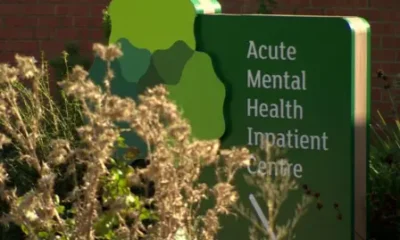Breaking News
Probe into Blackwater fish kill finds no definitive cause
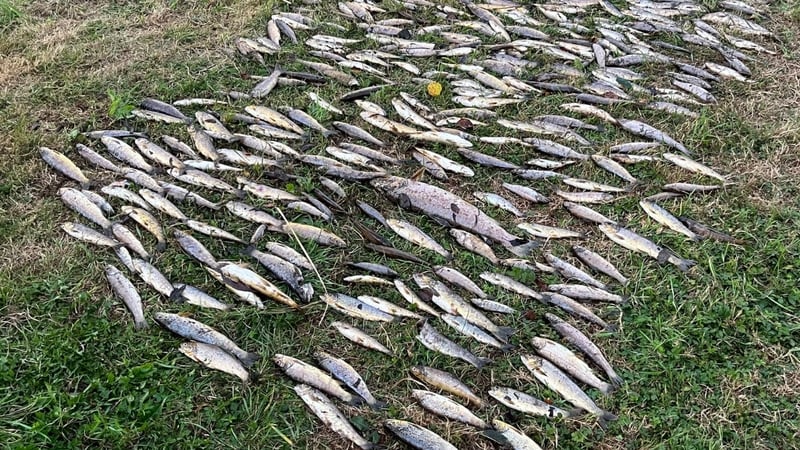
Read more on post.
The inter-agency group set up last month to investigate the cause of the large fish kill on the River Blackwater near Mallow in Co Cork in early August has concluded its work, but says it has not been able to identify the cause of the fish kill.
It is estimated up to 32,000 salmon and brown trout died in a 37-kilometre stretch of the river when an unknown environmental irritant entered the water.
This would make it the largest single fish kill on record here.
However, in its final report published this evening on the Inland Fisheries Ireland website, the interagency group said it could find no evidence to support a link between the fish mortalities and a point source of pollution, or a specific environmental insult or waterborne irritant.
The report said that no change in water quality in the affected stretch of river has been detected between 2024 and 2025.
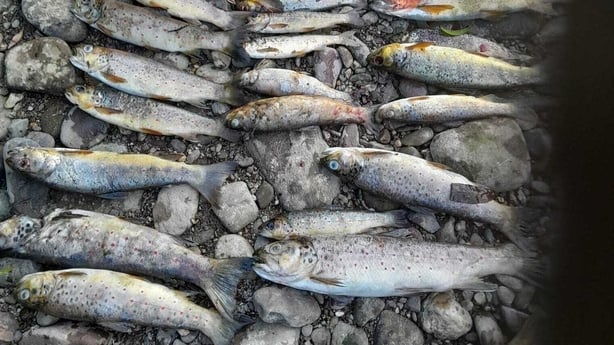
Diagnostic analyses by the Marine Institute on dead brown trout sampled from the river on 14 August had earlier found no evidence of systemic disease.
More recent analysis of brown trout for presence of chemicals, pesticides and heavy metals also did not identify any such possible irritant.
The report says the waterborne agent that caused the fish kill had a likely entered the river Blackwater around the 5 or 6 August and the first fish mortalities were observed 72 hours later, on 9 August 2025.
However, it says the pollutant dissipated quickly, rendering it undetectable in water samples and fish tissue samples.
There was no evidence of any mortalities of protected species such as otter or freshwater pearl mussels.
Neither were there any mortalities among bird species, nor indications that livestock health and the food chain from primary production was affected by the fish kill incident.
The report also details the outcome of 85 different investigations and inspections in relation to water quality issues along the affected stretch of river but could find no causal link to the fish mortalities.
It found no evidence of a chronic water quality problem, either before or after the fish mortalities.
This suggests, according to the report, that the cause of the mortalities was a short-term pollution event.
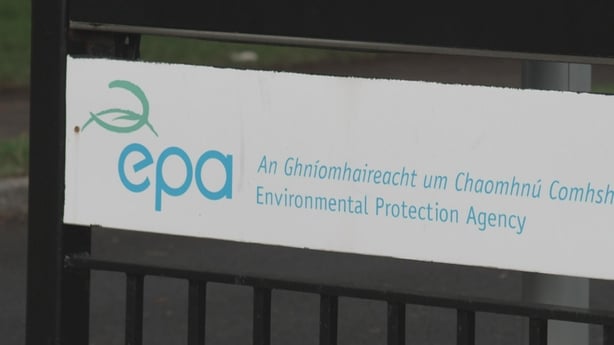
The EPA investigated regulated sites in the River Blackwater catchment, including industrial facilities, wastewater treatment plants and drinking water plants but it could establish no causal link between these activities and the fish mortalities in the River Blackwater.
20 complaints were received from members of the public in respect of the incident and were followed up by the EPA but again, no causal link with the fish kill could be established.
Cork County Council also inspected twenty light industrial and commercial sites within the catchment, comprising all businesses licensed under Section 4 of the Local Government Water Pollution Act as well as other commercial operators.
14 investigations of agricultural activities within the catchment were also carried out. But in all cases, a causal link to the incident could not be established.
In addition, Inland Fisheries Ireland itself carried out 198 habitat inspections, and 52 repeat habitat inspections, at 47 locations along the affected stretch of river.
It conducted macroinvertebrate sampling at 10 different sites. It also sent fish samples to Germany, via Eurofins Environmental Ltd, to be tested for a broad suite of 900 chemicals, pesticides and heavy metals.
Yet despite all these investigations, nothing was found.

Minister of State with responsibility for Fisheries and the Marine, Timmy Dooley, has welcomed the publication of the summary report from the inter-agency group, which he says provides a clear account of the response to, and the investigation into, the incident.
He said: “The extensive fish mortalities that occurred on the River Blackwater represent a serious impact to local fish stocks and have had a deeply negative impact on surrounding communities.
“Although the evidence points to this being a short-term pollution event, Inland Fisheries Ireland estimate that up to 32,000 salmon and brown trout mortalities may have occurred.
“The investigation has now concluded. In this instance, a definitive cause could not be identified despite the extensive and significant investigation by members of the inter-agency group.
“The report does assert that that a waterborne irritant likely entered the river up to 72 hours before the first mortalities were observed, at a point most likely upstream of the mortalities initially observed by IFI. It dissipated quickly, resulting in it being undetectable in subsequent water samples and fish tissue samples.
“The findings in the report do give reassurance that this was a short-lived event, with no evidence of ongoing pollution risks. I want to emphasise that the investigation was exhaustive and involved extensive sampling, testing and monitoring – by multiple State agencies.”
Breaking News
Mental health patients sleeping on sofas months after issues found
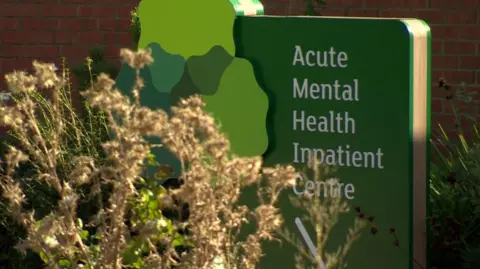
Read more on post.
Niall BlaneyBBC News NI
Some patients with serious psychiatric conditions are still sleeping on sofas at a Belfast mental health facility months after serious building problems were discovered there.
The Acute Mental Health Inpatient Centre opened just six years ago at a cost of £33m, but has been dogged with issues.
Rot and black mould were previously found in the building – which has continued to suffer from newly-discovered leaks – and the entire water system now needs replaced, which will add millions of pounds to existing repair costs.
The Belfast Health Trust said no patients have had to move out as a result of the building issues, and works on two damaged bedrooms are due to be completed in “the coming days”.
The centre at Belfast City Hospital provides 74 acute mental health en-suite bedrooms, including six psychiatric intensive care beds.
Last September, it was revealed that leaking pipes in the Acute Mental Health building had caused £4m worth of damage. Water had been dripping from various pipes since 2022 causing corrosion within the hot water system and damage to walls and floors.
At the time, it was thought damage was confined to a small area.
But further exploration which involved ripping up two bedrooms identified more extensive damage, including leaking pipes across the building which had saturated floors and caused metal stud walls to rot and mould to grow on plaster.
One bedroom previously had an ant infestation and was closed immediately.
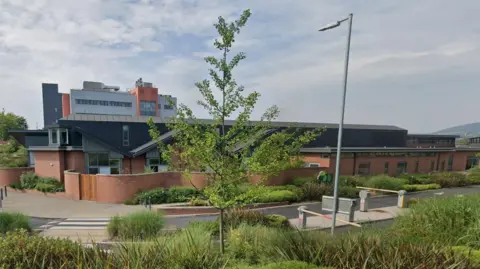 Google
GoogleIn March, the BBC revealed that repair costs for the building could be up to £10m.
Last month, the health trust said the projected costs for the newly-discovered water system issues were up to £6m, not including legal fees.
Two bedrooms which had suffered damage were due to be repaired by the end of this summer. As a result of their closure, capacity at the unit has been stretched, leading to patients forced to sleep on sofas.
The Belfast Trust said: “Works on the [bedrooms] are almost complete and are subject to final checks… it is expected that both rooms will be available for the delivery of services in the coming days.”
Plans to rehome patients
While a plan has been put in place to temporarily rehome patients at Knockbracken Healthcare Park south of Belfast, that facility has not been used to date.
The trust is taking legal advice over where liability for the building failures lies.
The facility was built by Graham BAM Healthcare Partnership (GBHP), a joint partnership between County Down-based Graham Construction and BAM Ireland in the Republic of Ireland.
GBHP has also been involved in Belfast’s new maternity hospital which remains unopened and almost £50m over budget.
The Belfast Trust said it was “currently working with its legal advisors to appoint independent specialists to undertake a comprehensive review of the water system and any potential sources of water ingress and to help identify liability for the costs of the remediation work”.
In a response to the BBC, the trust said a survey of the entire building had taken place ahead of the repair works.
In August 2024, the body which inspects healthcare facilities – the RQIA – issued a notice to the trust telling it to replace doors and door handles at the facility because of potential patient self-harm as a result of ligature risks.
This was to be complied with by 17 February this year, with an extension granted to April, and now compliance required by this November.
Breaking News
School secretaries and caretakers dispute back before WRC

Read more on post.
Talks on access to pensions for school secretaries and caretakers will resume at the Workplace Relations Commission (WRC) today.
The dispute saw more than 2,600 school staff, who are members of the Fórsa trade union, engage in strike action for more than a week impacting around 2,000 schools.
Fórsa withdrew the strike action after an agreement was reached to engage in a process to resolve the dispute.
The union said that the key element of the proposals is a Government commitment to negotiate pension entitlements for school secretaries and caretakers that are comparable with teachers and Special Needs Assistants (SNAs).
Negotiations were held at the WRC for around two hours earlier this month and the talks will resume later this morning.
Aside from pensions, the agreement also provides for discussions on other issues including access to bereavement leave and sick leave, as well as the conclusion of a pay deal for caretakers.
If there are any outstanding issues following the WRC talks, the parties have agreed to have the matters referred to the Labour Court.
Breaking News
Dublin house price inflation eases – DNG

Read more on post.
The annual rate of price increase in the Dublin residential property market has moderated for a third quarter in a row, according to new research.
The latest results of the DNG House Price Gauge (HPG) show that in the three months to September, the average price of a resale home in the capital increased by 0.9%, in contrast to the same period last year when prices rose by 2.5%.
The annualised rate of Dublin house price inflation moderated to 6.2% for the year to September 2025, lower than the rate of 8% recorded in the year to June 2025, and below the rate of 9.6% recorded in the year to March 2025.
According to the DNG HPG, the average price of a Dublin home has increased by 150% since the last market low point in 2012, however, prices still remain below the previous historical peak seen in 2006.
Prices at the upper end of the market are 24.5% below their previous peak, while prices at the entry and mid-market levels are less than 5% lower than the previous peak.
The average price of a resale property in the capital now stands at €605,612.
The DNG Apartment Price Gauge (APG) recorded an increase in apartment values in the third quarter of the year of 1%, this compares to a 1.1% increase in the second quarter and 1.9% in the first three months of the year.
The research shows that the percentage of DNG sales by investors offloading rental properties increased to 27% of sales in the third quarter of the year, up from 20% of sales in second quarter.
An analysis of DNG purchasers during the third quarter shows that first time buyers accounted for just over half of purchases of resale properties in the capital.
“The latest results of the DNG House Price Gauge paint a picture of stability in the Dublin residential market at the present time, with price inflation moderating as this year has progressed,” said DNG’s Director of Research Paul Murgatroyd.
“House price inflation in the capital was running at close to 10% per annum at the end of last year but since then the rate of increase has gradually eased back to a more sustainable level,” Mr Murgatroyd.
-
Culture3 days ago
Taylor Swift’s new cinema outing generates more than €12million in just 24 hours
-
Politics3 days ago
European Parliament snubs Orbán with vote to shield Italian MEP from Hungarian arrest
-
Health3 days ago
EU renews support for WHO’s Universal Health Coverage Partnership
-
Culture2 weeks ago
Life, loss, fame & family – the IFI Documentary Festival in focus
-
Culture2 months ago
Fatal, flashy and indecent – the movies of Adrian Lyne revisited
-
Culture3 days ago
Twilight at 20: the many afterlives of Stephenie Meyer’s vampires
-
Environment6 days ago
Key oceans treaty crosses threshold to come into force
-
Culture1 week ago
Farewell, Sundance – how Robert Redford changed cinema forever




